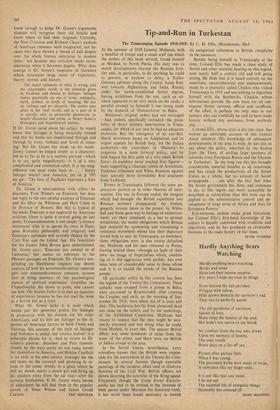Tip-and-Run in Turkestan
The Traoscaspian Episode 1918-1919. By C. H. Ellis. (Hutchinson, 30s.) IN the summer of 1918 General Malleson, with a handful of troops and a small staff (on which the author of this book served), found himself at Meshed, in North Persia. His duty was to watch developments beyond the Russian fron- tier and, in particular, to do anything he could to prevent, or anyhow to delay, a Turko- German advance along the Central Asian Rail- way towards Afghanistan and India. Russia; under her newly-established Soviet regime,, having withdrawn from the war, such an ad- vance appeared to be very much on the cards; a parallel attempt to forestall it was being made by the dispatch of `Dunsterforce' to Baku.
Malleson's original orders had not envisaged —had, indeed, specifically excluded—the possi- bility of direct military intervention in Trans- caspia, for which in any case he had no adequate resources. But the emergence of an anti-Bol- shevik movement based on Ashkhabad, and its urgent appeals for British help, led the Indian authorities—the controllers of `Malmiss'—to acquiesce in a more forward policy; and by mid-August the first units of a very small British force—its numbers never reached four figures— were supporting a reluctant rabble of Armenians, Tnrkman tribesmen and White Russians against their scarcely more formidable Red assailants from Tashkent.
Events in Transcaspia followed the same un- attractive pattern as in other theatres of inter-, vention. The war in Europe ended,, the dangers which had brought the British expedition into Russian territory disappeared, the limited, gingerly interest taken in the project by White- hall and Simla gave way to feelings of embarrass- ment; yet there remained, as a bar to prompt withdrawal, the moral obligations which Britain had incurred by sponsoring and stimulating a resistance movement whose fate their departure would help to seal. In Transcaspia, as elsewhere, these obligations were in due course defaulted on; Malleson and his men returned to Persia, leaving behind them—through no fault of their own—an image of Imperialism which, combin- ing as it did aggression with perfidy, has ever since been of considerable value to those whose task it is to mould the minds of the Russian people.
Of particular utility in this context has been the legend of the Twenty-Six Commissars. These unlucky men escaped from a prison in Baku, were rearrested in Krasnovodsk after crossing the Caspian, and early on the morning of Sep- tember 20, 1918, were taken out, of a train and shot. This barbarous but far from abnormal deed was done on the orders, and by the underlings, of the Ashkhabad Committee. Malleson had reason to suspect that the men might be sum- marily executed and was doing what he could, from Meshed, to avert this. The nearest British officer was some hundreds of *miles from the scene of the crime, and there were no British or Indian troops in the area.
In the Soviet Union, nevertheless, every schoolboy knows that the British were respon- sible for the martyrdom of the Twenty-Six Com- missars. In several famous though execrable paintings of the incident, often used to illustrate histories of the Civil War, British officers are shown directing the activities of the firing squad. Frequently though the Great Soviet Encyclo- predia has had to be revised in the interests of what passes under Marxism for historical truth, it has never been found necessary to amend its categorical references to British complicity in the massacre.
Besides being himself in Transcaspia at the time, Colonel Ellis has made a close study of Soviet and other material bearing on this legend, now nearly half a century old and still going strong. He finds that it is based entirely on the assertions, uncorroborated and undocumented, made by a journalist called Chaikin who visited Transcaspia in 1919 and was seeking to ingratiate himself with the Bolsheviks. Chaikin, whose. fabrications provide the sole basis for all sub- sequent Soviet versions, official and unofficial, of the affair, is perhaps the only man in our century who can truthfully be said to have made history without any assistance from anybody else.
Colonel Ellis, whose style is dry but clear, has written an admirable account of this Central Asian sideshow. His knowledge of subsequent developments in the area is wide; he has this to say about the policy, inherited by the Soviets from the Tsars, of settling large numbers of colonists from European Russia and the Ukraine in Turkestan: 'In the long run this has brought considerable material benefits to all concerned, and has raised the productivity of the Soviet Union as a whole, but no amount of Soviet propaganda . . . can alter the fact that what the Soviet government has done, and continues to do, in this region can more accurately be described as colonialism than this term can be applied to the administrative control and de- velopment of large areas of Africa and Asia by European Powers.'
Eye-witnesses seldom make good historians; but Colonel Ellis's first-hand knowledge of his subject is happily combined with erudition and objectivity, and he has produced an invaluable footnote to the main history of our times.
PETER FLEMING






























 Previous page
Previous page